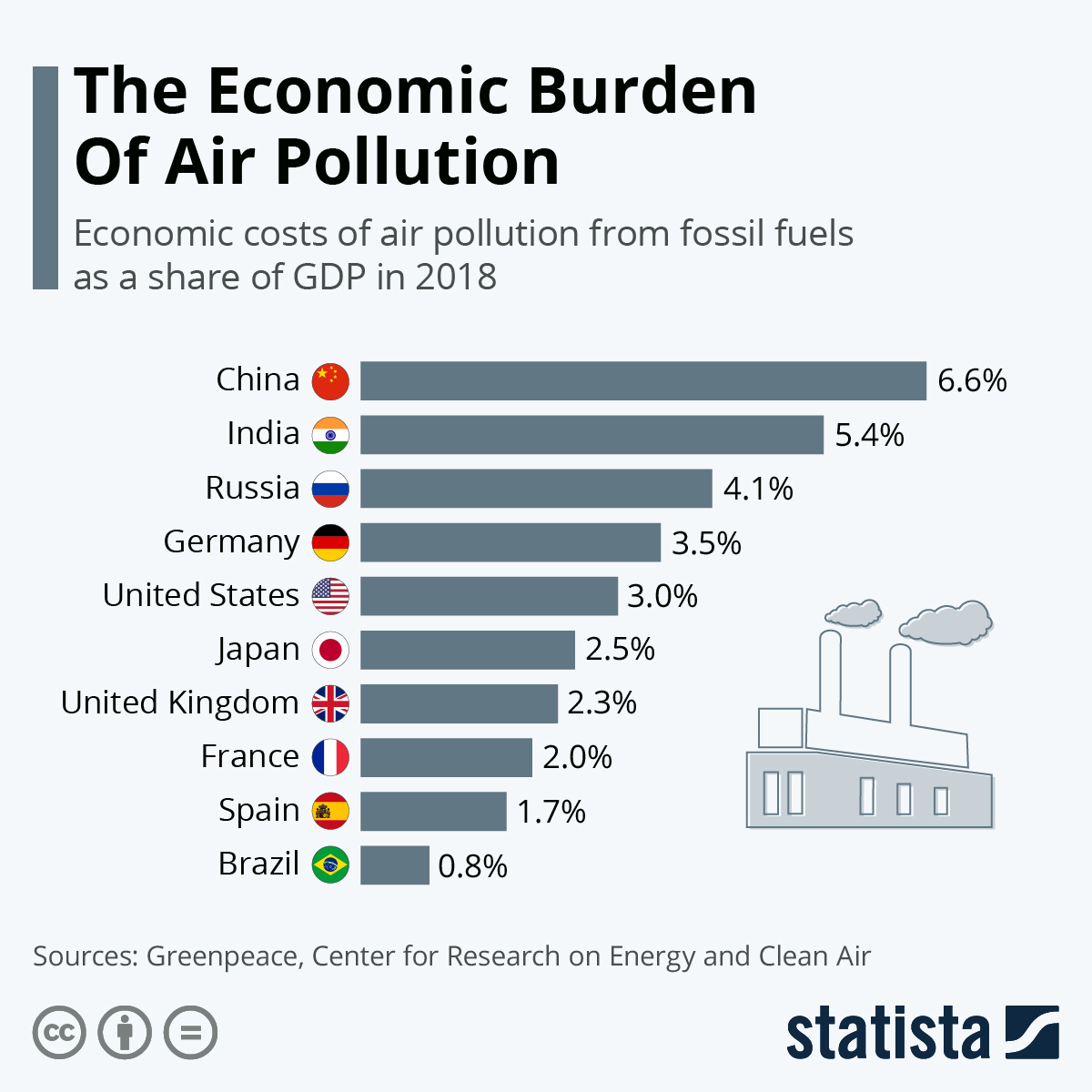- Scientists on an Antarctic expedition found that chinstrap penguin populations have plummeted.
- Half of US pollution deaths occur in states where the pollution didn’t start, according to a new study.
- Globally, air pollution from fossil fuels costs $8 billion per day.
- And more…
Antarctica’s chinstrap penguins (pictured above) are suffering at the hand of climate change.
Scientists on an 11-day Greenpeace expedition to Antarctica’s Elephant Island to count chinstrap penguin nests found that thousands of penguins are missing. One chinstrap penguin colony has decreased by 77% in nearly 50 years.
This was a huge surprise, as up til now, the chinstrap penguin has been the most abundant penguin species in Antarctica. The chinstrap penguin was previously considered a species of “least concern” by the International Union for Conservation of Nature.
Ornithologist Noah Strycker told National Geographic:
Comparing it to the number from 50 years ago, we’ve found a 56% drop in chinstrap penguin nests, which is rather shocking.
National Geographic continues:
Due to its remote location and challenging conditions, the last census of the chinstrap penguins of Elephant Island was taken in 1971, and that survey identified 123,000 nests. Strycker and his team found less than half of that number.
Why is this happening? Food chain disruption.

Gentoo penguin
Climate change has led to reduced sea ice and warmer oceans — it was a record-breaking 68F (20C) on Thursday at Antarctica’s Seymour Island — which has meant less krill, a main penguin diet staple. And in turn, the Gentoo penguin’s numbers are increasing, as it has a varied diet, including fish and squid, and it can survive in a wider range of conditions.
But this isn’t good for penguins as a whole. The Guardian reports:
Most penguin species are suffering from the warming climate. Two years ago, scientists warned 70% of king penguins could either disappear or be forced to find new breeding grounds by the end of the century. An earlier study found 60% of the Adélie penguin habitat in Antarctica could be lost.
Can we save our aquatic flightless friends? Greenpeace UK says yes:
As wildlife struggles, we urgently need new ocean sanctuaries in the Antarctic and across the world. With these in place, animals like these penguins have the space to recover and adapt to our rapidly changing climate, safe from harmful industries.
Click on the Greenpeace UK link above to see how you can help.

Wyoming coal plant
To state the obvious, pollution doesn’t recognize or respect state boundaries.
According to a new study by MIT researchers published in Nature, half of pollution deaths in the US occur in states where the pollution didn’t start. It’s the first study to quantify mortality results.
The MIT researchers focused on combustion pollution such as car and truck engines, power plants, and home HVAC systems. Sectors that are subject to less EPA regulation (although that may change, since the EPA may have its budget slashed by one-quarter) have become greater sources of cross-state pollution. Commercial and residential emissions are now twice that of the power generation sector.
The biggest losers were New York, which experienced the largest number of premature deaths — 3,800 in 2018 — from air pollution created outside the state.
The biggest offenders were Wyoming, North Dakota, and West Virginia, which most consistently produced pollution that affected the health of those in other states.
This happens because of air patterns — and it’s also a perfect example of the fact that we’re all in this together.
Photo: Josh Galemore/Casper Star-Tribune
Pollution doesn’t respect international borders, either. A new report by the Center for Research on Energy and Clean Air and Greenpeace Southeast Asia called “Toxic Air: The Price of Fossil Fuels,” found that air pollution generated by burning fossil fuels causes about 4.5 million premature deaths worldwide annually.
Further, the economic and health costs of air pollution from burning fossil fuels totaled $2.9 trillion in 2018. This was calculated in the form of work absences, years of life lost, and premature deaths.
The study is the first of its kind to quantify the global impacts of air pollution caused by burning fossil fuels.
The most premature deaths from fossil fuel-related air pollution in 2018 were in mainland China (1.8 million), India (1 million), and the US (230,000). Those three countries had the highest annual costs: $900 billion in China, $600 billion in the US, and $150 billion in India. Statista breaks it down by annual percentages as a share of GDP in 2018:

Climate change affects our planet and our health — and thanks to fossil fuels, it’s expensive.
A decade-long study of the Amazon rain forest has found that around 20% of the forest, especially in the southeastern section, has become an emitter of greenhouse gases instead of a carbon sink. This is due to deforestation because growing trees absorb carbon, but dead trees emit it.
You can read more about the state of the Amazon here, on the World Economic Forum’s website, and watch the video below for an overview of the current situation in this vital ecosystem.
20% of the Amazon is a greenhouse gas source.
📕 Read more: https://t.co/7FKoo5LBmO pic.twitter.com/YEqxKEfMJX
— World Economic Forum (@wef) February 13, 2020
UN Development launched an interactive climate-change game called Mission 1.5 Degrees on Thursday.
It’s interactive, it’s country-specific, and they’ve managed to make a serious topic both fun and educational. (Hey UN folks, have you been talking to the Sesame Street folks? They were always good at that kind of thing.)
Click on the above link to learn and play, and kudos to UN Development for turning to mobile gaming tech to get the message across in an innovative way:
We have liftoff! #Mission1Point5 is live! Board now to #VoteForClimate. The average person spends 3.5 hours a day on their 📱. Why not use your ⏱️ for #ClimateAction? We’re using mobile gaming tech to inspire #ClimateActionNow: https://t.co/bIbERiOmL7 pic.twitter.com/GhwvNrocyI
— UN Development (@UNDP) February 13, 2020
Got a thing for Oreos and Cheez-Its? (Yeah, I kinda like them, too.) Wonder what the heck climate change would have to do with these snacks? This video from Bloomberg explains how it’s affected soft red winter wheat, which goes into crackers and biscuits:
Hope you had a nice Valentine’s Day! #FridaysForFuture showed their love for the planet with climate strikes. Yes, the Friday strikes continue to be alive and well and will be indefinitely until we have a firm global plan to tackle the climate crisis that makes a difference. Here are a couple of scenes from what went on yesterday. This is in Birmingham, in the UK:
Who’s future?
Our future!
Who’s planet?
Our planet!#ClimateStrike @Strike4Youth @UKSCN1 @EarthStrikeUK pic.twitter.com/BoDYwQOkaK— Birmingham Youth Strike 4 Climate 🌍 (@bhamys4c) February 14, 2020
St. Matthew’s primary school in Leeds came out to show their support, Valentine’s Day style:
Valentine’s Day is all about love and the things we love might be destroyed by Climate Change if we don’t act now.
We came out of class to show the world how much we love our planet. Please look after our future.#YouthStrike4Climate #FridaysForFuture pic.twitter.com/qa6prAgewt— St Matthew’s Leeds (@stmatthewsleeds) February 14, 2020
There was a march in Stockholm, with Greta Thunberg:
School strike week 78. #fridaysforfuture #schoolstrike4climate #climatestrike pic.twitter.com/oGMvKubICw
— Greta Thunberg (@GretaThunberg) February 14, 2020
Here’s a secondary school assembly in Sierra Leone:
Umass Secondary School – Sierra Leone is holding a students assembly again to #SchoolStrike4Climate @GretaThunberg @IsataRoseline @Fridays4future #FridaysForFuture pic.twitter.com/kvfDt0QyLr
— Fridays For Future – Sierra Leone (@FFF_SierraLeone) February 7, 2020
And Elizabeth Wathuti in Nairobi and Milena Batista in Brazil, we salute your bravery. Going it alone as a young climate striker can be tough, as the Guardian reported on Thursday.
#ClimateStrike Week 9! Nairobi, Kenya🇰🇪
Spreading love❤to planet earth🌎is one love we can all share this #ValentinesDay
We aren’t asking for a favour in fighting the #ClimateCrisis! It’s our right!🌎 #FridaysForFuture#schoolstrike4climate @350 @Fridays4future @GretaThunberg pic.twitter.com/Oy92OGA7QU
— Elizabeth Wathuti 🇰🇪 (@lizwathuti) February 14, 2020
I’m Milena.
I am a young environmentalist from Brazil.
Long droughts and excessive rains are part of our lives because of the #ClimateCrisis. Our government is doing nothing about it.
WE WANT #climatejustice! And you? #fridaysforfuture #climatestrike #schoolstrike4climate pic.twitter.com/WXqTghHh5h— Milena Batista (@milensbatista) February 14, 2020
Check out our past editions of Climate Crisis Weekly.
Photo: Noah Strycker
Read the full article here


